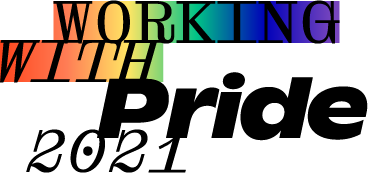
Here’s how you can support a rainbow co-worker
A good ally talks about their positive attitude towards rainbow folks at the workplace, intervenes when people say discriminatory things and listens to minorities.

Sexual and gender minorities remain in the closet in Finnish working life even though our legislation is at a good level, says Seta’s Education Expert Marita Karvinen, who trains organisations in matters related to the diversity of gender and sexuality in her work.
The European Union Agency for Fundamental Rights (FRA) has surveyed experiences of discrimination and harassment experienced by sexual and gender minorities in EU countries. 92 % of the Finnish members of sexual and gender minorities who responded to the survey said that they were either completely or selectively in the closet at the workplace.
– It is typical that members of rainbow minorities are open to certain colleagues and not to others. They often have some kind of parallel story to fall back on and they talk about their partner using euphemisms. They might not participate in the informal gatherings of the workplace to spare themselves of uncomfortable situations, says Karvinen.
No one is obligated to come out of the closet. However, a person who does not speak about themselves and their leisure time as openly as others might make their co-workers suspicious of what is going on.
Most Finns are rainbow-positive, but we do not express it.
The person who does not participate is also left on the outskirts of the work community and a lot of silent knowledge passes them by.
According to FRA’s survey, 46 % of Finnish members of sexual and gender minorities have never felt supported by members of the majority, and only slightly over 30 % had ever heard or seen someone defend the rights of rainbow folks.
Talk about your positive attitude towards rainbow people
Demonstrating allyship at the workplace is important. In this context, an ally is a person belonging to a sexual or gender majority who wishes to act in support of the equality and equal treatment of rainbow folks.
If the work community consists of persons representing the same age group and gender, for example, the members of the community might assume that everyone is the same and this assumption easily becomes the norm. In such an atmosphere an employee who considers themselves different might keep their identity a secret and the discrimination might go unnoticed.
– Most Finns are rainbow-positive, but we do not express it. Perhaps it is a part of the Finnish culture, mentality and our respect for privacy that we are not accustomed to talking about personal matters at work. However, it is important to voice one's positive thoughts and values concerning minorities by commenting on topical news surrounding the issue, for example. This signals to colleagues that they are allowed to talk about these things.
If Matti says at work that he spent the weekend fishing with his partner Pertti, for example, you ask follow-up questions just as you would with anyone else, instead of falling into an uncomfortable silence.
– Allies are needed because they are in a position of power, they do not break the norms and they are listened to. An ally is also at a lower risk of facing discrimination than a member of a minority. A good ally must have a basic understanding of the issues and they must listen to the persons concerned.
An ally must understand that at the end of the day it is not about polishing one's own image – it's not about you.
Intervene when you hear crass talk
Everyone shares the responsibility for the atmosphere of the workplace. If you hear a bad joke, it is important that you bring the topic up at the coffee table or ask the other person what they meant by it.
– People easily fear that they might gain a reputation as an uptight person if they do this, but they should be aware that it is unlikely that they are the only tolerant person at the workplace. Matters are easier to address if you know that you will be supported by others.
If the atmosphere for discussion is not as good as it could be, members of the work community should bring the matter up with their supervisor and think about what could be done about stereotypical jokes and prejudiced comments. If a subordinate does not receive support from their supervisor, they could contact the organisation's board, management group, regional state administrative agency or the non-discrimination ombudsman.
An ally could also found a rainbow network or group that gathers information on the needs of rainbow folks and passes it on within the organisation.
It is important to say out loud that: “Please, correct me if I am unable to verbalise things properly”, or ask an expert if you do not know how to talk about these things.
Apologise for your mistake and move on
What if one fears that they address a colleague using the wrong term or if one is unfamiliar with the minority lingo? Uncertainty and making mistakes are human, as long as you admit to your mistakes and are open to learning new things, Karvinen says.
– It is important to say out loud that: “Please, correct me if I am unable to verbalise things properly”, or ask an expert if you do not know how to talk about these things. If you, for example, misgender a colleague or call them by the wrong name after their gender reassignment, you should listen to them, apologise and move on, instead of stopping to explain yourself.
It’s not about you
It is important to keep in mind that an ally is not a saviour or hero of minorities, but on a shared mission with them.
– An ally must understand that at the end of the day it is not about polishing one's own image – it's not about you. An ally must also remember that each rainbow person is unique and there is great variation in the needs and experiences of different people.
Why is being an ally worth it?
Studies have demonstrated that rainbow-friendly companies are healthier by many metrics. The productivity of a company increases if people can be themselves at work. Inclusivity also raises the profile and responsibility of the company's and organisation's brand.
Laws on equality and equitable treatment also oblige organisations to promote the realisation of equality, and organisations with over 30 persons must create a plan for realising equality goals. An organisation of just two people is also obligated to promote equality and equitable treatment.
In the end, allyship is important for the well-being of employees. If Matti from our example is not allowed to be himself at the company, he will change workplaces.
– I would like everyone to be aware of how little effort it takes to be an ally. Even small acts can result in great things.